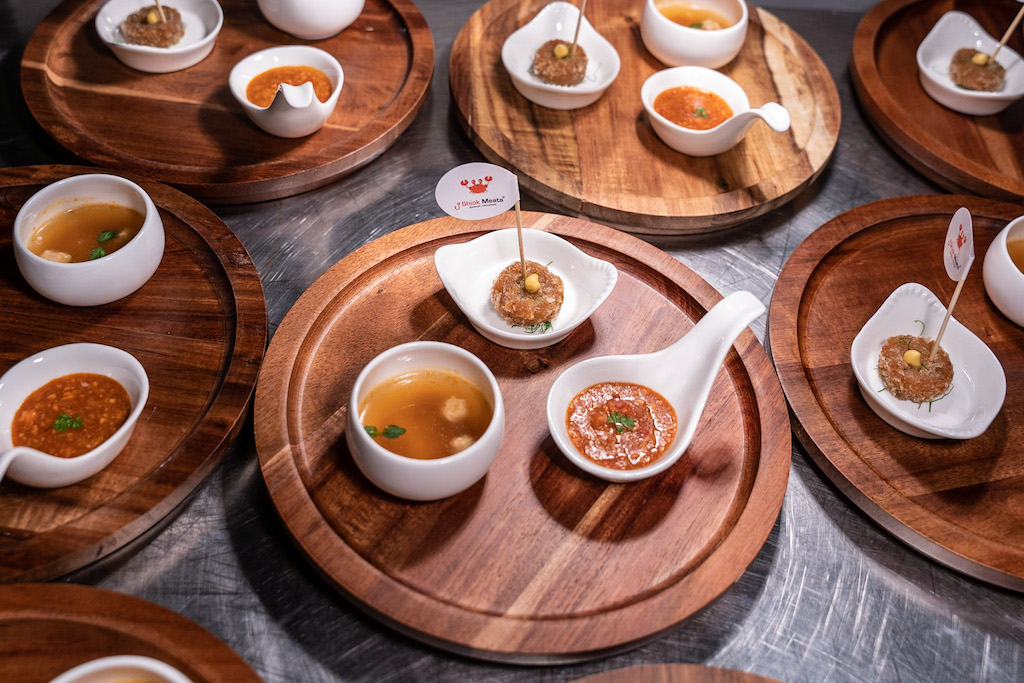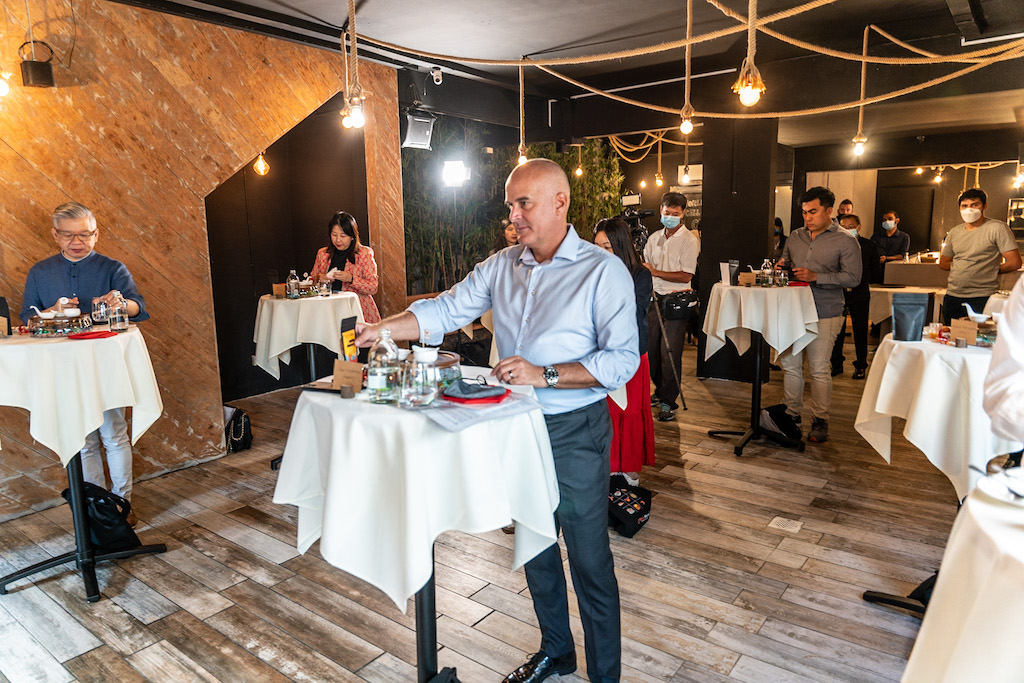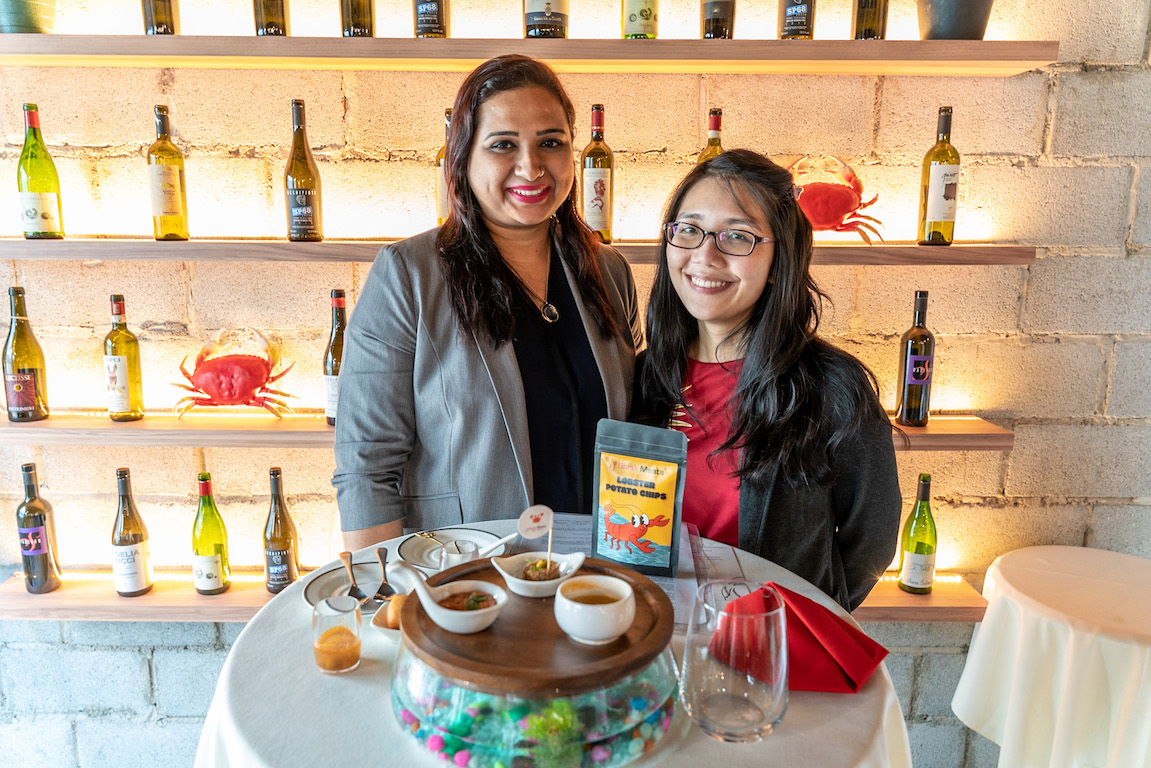4 Mins Read
Diners joining Shiok Meats’ private testing event were treated to the world’s first-ever cell-based crab meat. Collaborating with Chef José Luis Del Amo, the Singapore food tech unveiled crab cakes and chilli crab, as well as lobster and shrimp dishes—all made from seafood cultured directly from crustacean cells.
On August 26, diners invited to Shiok Meats’ private tasting event at Bukit Timah restaurant Kebaya got a first glimpse—and taste—of the world’s first cell-cultured crab meat. It was showcased by Chef José Luis Del Amo of TheTasteLab, who created two crab dishes, Crab Cake and Chilli Crab, from crab meat and powder cultured directly from cells by the Shiok team along with vegan pork mince OmniMeat.
Other culinary creations included Lobster-Flavoured Potato Chips and the regional classic dish Tom Yum Shrimp Soup—all prepared with the Singapore startup’s cell-based crustacean meat powder and seasoning, the latter blended with Roquette’s plant-based pea protein meatballs.

Cell-based seafood dishes
Sharing more about the tasting event, Shiok co-founders Dr. Sandhya Sriram and Dr. Ka Yi Ling said that they were “ecstatic” about debuting the first cell-based crab meat. “In this exclusive tasting event, we invited some of the key stakeholders in the food and alternative protein industry.”
The exclusive list of tasters included Vincent Yeo, the CEO of Singapore real estate giant CDL Hospitality Trusts, foodpanda’s communications VP Evelyn Tay, Chef Marcus Edwin Wu of the Rubato Group, and SATS Food Solutions SVP Thomas Ching, among others.
Chef José, who is a highly trained pastry chef with Classic Fine Foods, operated TheTasteLab and has crafted dishes for Shiok’s previous cultured lobster tasting event, said that the startup’s cell-based crustacean meats were “really versatile and works well across different cuisines, including local Asian dishes.”
“Also, it’s fantastic that we can now prepare delicious meals with sustainable crab meat,” Chef José added.
Despite beef and lamb remaining the most carbon-hefty meats, crustaceans like crab, lobster and shrimp require fossil fuel-powered vessels that burn an estimated 10,000 litres of dirty fuel per catch. It also harms marine biodiversity due to the long trawling methods used by commercial operations, as well as adding to plastic pollution with ghost nets discarded into the ocean.
Crab, in particular, is set to become a seafood category in great demand, making Shiok’s cell-based alternative a much-needed solution. Retail sales of crab have grown 60% since 2019, according to FAO data, with Asian countries leading the demand.

One step closer to commercialisation
Shiok says that its latest tasting event brings it yet another step closer to getting cell-based crustacean meats to diners’ plates. It has set the timeline for 2023, an ambitious but within-reach goal, given Singapore’s supportive regulatory environment.
In December 2020, the city-state became the world’s first to approve the commercial sale of cultured meat, and has since welcomed food techs all over the world to “apply early” to expedite the path to market for novel food products.
Shiok, in order to reach its goal of launching on the market by 2023, is now racing ahead to build what is the first cell-based seafood manufacturing facility in Singapore. It first revealed plans for the site back in November 2020 upon closing its $12.6 million in Series A funding, which elevated the startup to the most valuable Southeast Asian cell-based firm to date.
It has since raised additional undisclosed capital in a bridge round led by Asian food giants, including Vietnam’s seafood major Vinh Hoan and South Korean food giants Woowa Brothers and CJ CheilJedang.
Racing to lower costs
With an aim to commercialise within just two years time, one of Shiok’s primary hurdles is getting prices down. To that end, the company previously said it plans to be able to produce its cell-based crustacean meats for $50 per kilogram by 2022—far lower than the current $3,000 required per kilogram.
Looking ahead, Shiok says it wants to slash prices even further to $5 per kilogram, putting its slaughter-free and sustainable seafood within parity range with its traditional counterparts.
“Our mission is to develop cell-based crustacean meats that are contributing towards a cleaner and healthier seafood industry and solving for the inefficiencies around global protein production,” said Shiok’s co-founders. “We are working very hard on making sure that our products are delicious, healthy and affordable in the long run.”
But even before the firm gets to price parity, there appears to be a base of enthusiastic customers who are willing to pay the premium price to eat seafood that is free from ethical and environmental concerns.
In a recent internal consumer study conducted by Shiok, which found that over 78% of Singapore residents are open to try cell-based seafood, 2% of consumers—mostly young, well-educated and sustainability-minded—were identified as “early adopters” willing to pay as much as 50% more for cultured meat.
All images courtesy of Shiok Meats.




